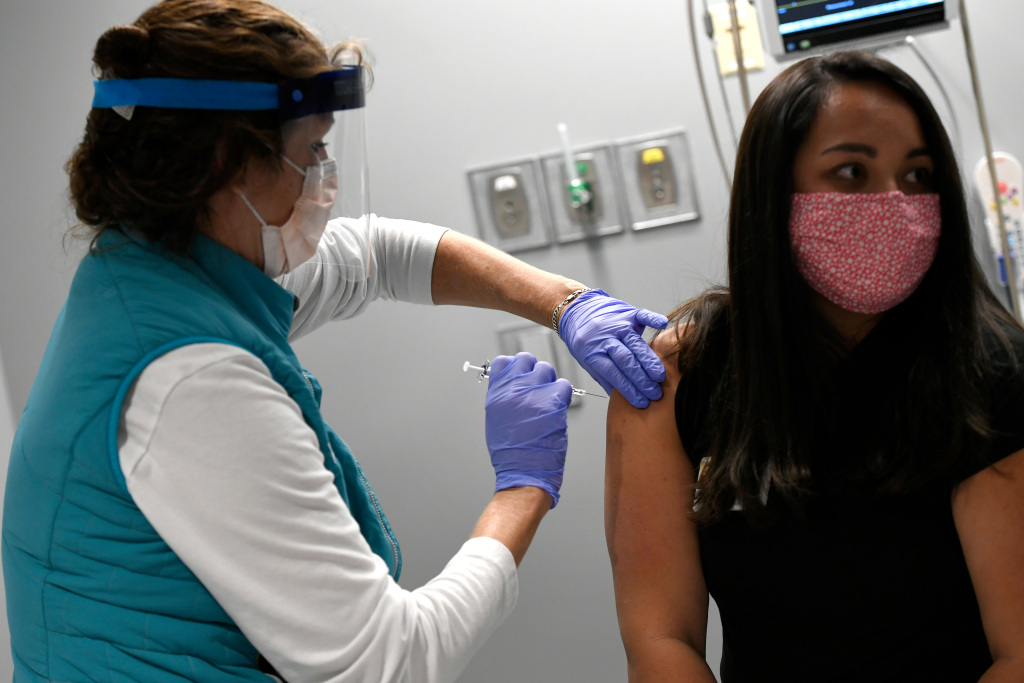With the first Coloradans due to be inoculated against COVID-19 next week, state leaders are scrambling to prepare for one of the largest mass-vaccination campaigns in history — a national effort unfolding so rapidly Colorado officials still don’t know how many doses they’ll receive beyond the next two weeks.
The U.S. Food and Drug Administration gave emergency use authorization to Pfizer’s two-shot coronavirus vaccine Friday night.
The first shipment of 46,800 doses of the Pfizer vaccine should arrive in Colorado between Monday and Wednesday, state and public health officials told The Denver Post. That’s expected to be followed sometime during the next week by 95,600 doses of Moderna’s vaccine, which is still waiting FDA approval.
“Our challenge right now: We haven’t heard from (the Trump administration’s) Operation Warp Speed what our third week and further distribution will be,” said Colorado National Guard Brig. Gen. Scott Sherman, who is leading the state’s vaccine distribution task force.
“It’s been extremely difficult and fast-paced,” he added.
State health officials have said any subsequent doses will come in weekly batches of as-yet-unknown quantities, with Colorado expecting 1.69% of any available vaccine, a figure based on the state’s population.
Colorado leaders face multiple hurdles — ranging from the ultra-cold temperatures required to store the Pfizer shots to vaccine hesitancy — in distributing the COVID-19 vaccines. That’s not to mention any unknown challenges that may arise in delivering the shots to the state’s rural and mountain communities in the middle of winter.
All of which will influence when the vaccine will become available to Coloradans outside Phase 1 of distribution, which begins next week and first will prioritize health care workers interacting most closely with coronavirus patients and those living and working in nursing homes and other long-term care facilities.
Those next in line will be other health care workers, first responders and people who work in home health, hospice and dental settings. This phase of distribution is expected to last at least through the winter, and by spring shots will be available to the much larger group of individuals in Phase 2, which primarily consists of essential workers and those with medical conditions that put them at high risk of complications from COVID-19.
When the state health department revised its vaccine-distribution framework this week, it didn’t rank or prioritize any of the groups listed within Phase 2 because officials are awaiting further guidance from the Centers for Disease Control and Prevention’s Advisory Committee on Immunization Practices, said Jill Hunsaker Ryan, executive director of the sate Department of Public Health and Environment.
Earlier this month, the CDC committee said health care workers and nursing home residents should be the first to receive any COVID-19 vaccines that become available — a recommendation adopted in this week’s changes to Colorado’s plan.
“So for Phase 2, we pretty much created the bucket of individuals,” Hunsaker Ryan said, adding that eventually the agency will prioritize who will go first in that second group and potentially in the final phase.
People currently due to be inoculated in Phase 3, set for next summer, include anyone aged 18 to 64 without high-risk conditions or jobs that qualify them for placement in the first tow phases.
Public health officials are no strangers to vaccine distribution, but with the COVID-19 shots they are tasked with delivering a vaccine that is new while battling a global pandemic still raging throughout the state.
On Friday, the state health department reported 3,513 new cases of the novel coronavirus and 1,559 people were hospitalized statewide with the disease. More than 3,800 people have died with COVID-19 in Colorado since the pandemic began.
“All of us want to end the pandemic, get back to more normal life, have in-person learning for our children, have a robust economy — and the only way to do that is through herd immunity,” Hunsaker Ryan said.
She estimated that 70% of people will need to have immunity to reach that point.
But the distribution of COVID-19 vaccines will take months — at least into the summer — because of how constrained the supply is, meaning Coloradans will need to keep wearing their masks, washing their hands and social-distancing.
State health officials on Friday identified the more than 150 health-care locations that will receive portions of the first two shipments of COVID-19 vaccines. The state also has nine hubs across the state that will receive additional doses to redistribute to other providers.
The hubs, which include Children’s Hospital Colorado in Denver and Vail Health, have ultra-cold freezers to store Pfizer’s vaccine. This is where the doses of vaccine will be broken down into fewer quantities before going to smaller hospitals that don’t have the ability to store the shots at the ultra-cold temperatures required.
The Pfizer vaccine will be delivered directly to hospitals and local public health agencies in thermal boxes filled with dry ice.
At the hubs, the vaccine vials will be put into ultra-cold storage, then before delivery to another provider, the thermal containers must be replenished with dry ice. The vaccine will be delivered from the hubs to providers by couriers and the Colorado National Guard, Sherman said.
Earlier in the week, the state simulated the delivery of Pfizer’s vaccine from Denver International Airport to Vail Health to test how prepared it is for the arrival of the shots.
“Another challenge we have is using these ultra-cold storage containers,” Sherman said. “They can only be opened twice a day.”
Pfizer’s vaccine is particularly difficult to store and ship. The vaccine has to be stored at about -75 degrees Celsius, or -103 degrees Fahrenheit. The vaccine can also be stored in a refrigerator at 2 to 8 degrees Celsius, or 35.6 to 46.4 degrees Fahrenheit — but only for five days, so it will have to be administered quickly.
Other challenges include: Hospitals will have to schedule the vaccines among staff so that people can take time off if they suffer from side effects, such as a fever. And in smaller, rural communities, people may have to drive 30 minutes to an hour to get both shots required for the vaccines, Sherman said.
“This is a massive and complex undertaking and I think it really shows the best of what state government has to offer,” Hunsaker Ryan said. “It’s really a herculean effort.”



















